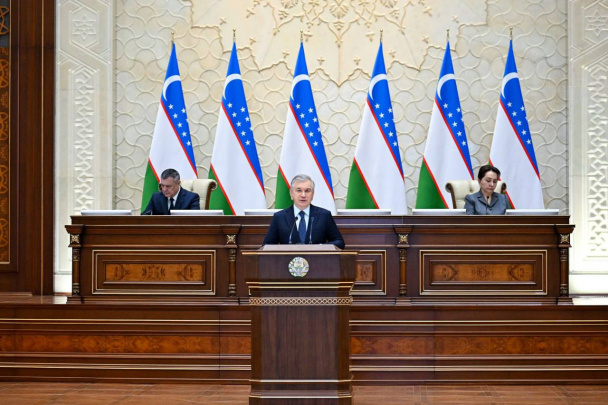Maternity leave budget for the private sector to be further reduced
In 2025, the maternity leave benefits funded by the state budget for women in the private sector are set to be reduced by another 2.5 times, bringing the total to 40 billion UZS (in 2024, the reduction was 3 times). Senators explained that this decision was due to the low rate of fund utilization, and they suggested that the program could be completed within 3–4 years at this pace.

Photo: Getty Images
The Uzbek government plans to reduce the budget for maternity and childbirth benefits for women working in the private sector by another 2.5 times in 2025. This is outlined in the state budget law for the upcoming year, which has been approved by both the Legislative Chamber and the Senate of Oliy Majlis.
Since September 2022, a system has been implemented where maternity leave benefits for women in the private sector are partially paid from the state budget. The amount of the benefit is equivalent to four times the minimum consumer spending (2.59 million UZS).
At a Senate meeting on December 18, Senator Malika Kodirkhonova revealed that the funds allocated for this program have been utilized at an alarmingly low rate. As a result, the amount allocated for the program has been decreasing year after year.
For example, in 2023, 300 billion UZS were initially allocated, but only 11% of the funds were actually used. In 2024, the budget was reduced by three times to 100 billion UZS, but by the end of the first nine months, only 30% of this amount had been utilized. Due to the ongoing underutilization of funds, just 40 billion UZS have been allocated for 2025, she explained.
If this trend continues, the program could be completely phased out within 3–4 years, the senator warned.
At the same time, the birth rate has been steadily increasing. In 2023, the number of newborns exceeded 960,000, and in the first nine months of 2024, it surpassed 690,000.
"We raised this issue last year as well. The problem isn’t with the reduction of benefits, but with the fact that women in the private sector are not fully able to access this guaranteed right. Here’s a striking statistic: in 2023, the share of women in the private sector who received maternity and childbirth benefits was only 1.7%, despite the fact that 1.4 million women were employed in the private sector," Malika Kodirkhonova said.
The senator also highlighted the challenges faced by women working in the informal sector.
"They have no access to these benefits. Although the government has made significant commitments to reduce the share of informal employment... The problem is clear, but what specific measures are being taken to address it? Perhaps it is time to develop mechanisms that hold private employers more accountable, while also offering incentives for them?" she asked.
Deputy Prime Minister and Minister of Economy and Finance Jamshid Kuchkarov mentioned that the number of individual income tax payers had increased by 5.6% compared to the same period last year, but acknowledged that this was still insufficient.
He did not elaborate on the planned measures but suggested that Senate leader Tanzila Narbayeva organize discussions, seminars, or roundtable talks on the issue of legalizing employment.
"We need to provide a more detailed explanation. If we impose strict measures now... Of course, we must take tough measures, but we need to be transparent about it. At this point, we should gather together and discuss this matter systematically, involving entrepreneurs," he stated.
Tanzila Narbayeva reminded that the initiative to provide maternity leave benefits to women in the private sector was introduced under the president’s gender policy, aimed at improving conditions for women.
"This initiative has been developing over the years. However, even in developed countries, it cannot be immediately implemented at an ideal level. Therefore, it was a good suggestion to discuss this issue in a joint meeting... I know that your deputy has signed a memorandum with a representative of UN Women. This organization, our ministry, the Senate, and the Legislative Chamber should all engage in a comprehensive discussion of this system," she explained.
The Senate leader also emphasized that if necessary, the budget for maternity leave benefits could be increased during the course of the year.
As previously mentioned, the expenses for maternity and childbirth benefits for employees of budgetary organizations were reduced from 1 trillion soums to 850 billion soums in 2024.
Related News

16:50 / 15.03.2025
Senate proposes stricter laws against drunk and unlicensed driving

13:33 / 08.03.2025
Electronic payments made mandatory for utility and budget organizations

17:20 / 05.03.2025
President calls for stronger anti-corruption measures, orders major staff overhaul

16:57 / 25.02.2025



